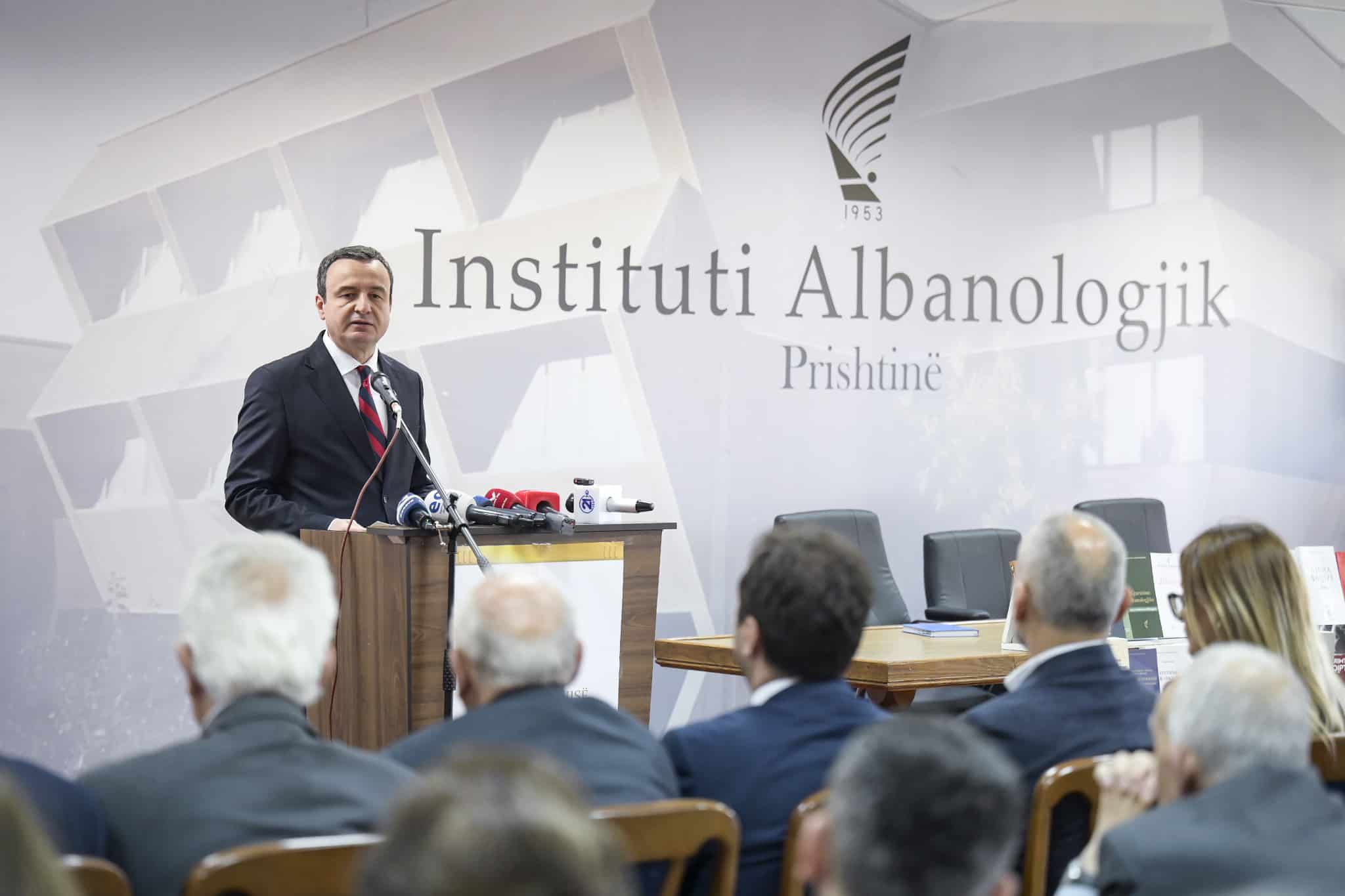Honorable Acting Director of the Albanological Institute, Mr. Naim Berisha,
Honorable President of the Academy of Sciences and Arts of Kosovo, Mr. Mehmet Kraja,
Honorable Ambassador of the Republic of Albania in Kosovo, Mr. Petrit Malaj,
Honorable Mr. Adil Olluri, Scientific Secretary,
Distinguished members of the Academy and the Organizing Council,
Respected professors, researchers, and staff of all branches of the Albanological Institute,
Honored guests,
It is a special honor for me to be among albanologists and to have the privilege of delivering this speech!
I say ‘a special honor’ because you are the ones who, throughout your academic work, deal with the most essential aspects of our people’s identity — from language, literature, folklore, ethnography, songs, and everything that culturally makes us who we are: Albanians. It is important to note that the emergence of Albanology coincides with the period of our national awakening. From Georg von Hahn, who is considered the father of Albanology, to the distinguished American albanologist Eric Hamp, we have a long line of foreign albanologists who paved the way, deepened, and expanded the knowledge of our language and culture, our history and antiquity. Through the results of their work, they irrefutably demonstrated that the Albanian language belongs to the Indo-European language family and that Albanian culture is part of the European cultural sphere. In doing so, they brought to light and answered the cardinal question of who the Albanians were.
After them came another generation of scholars, the generation of Albanian albanologists such as Eqrem Çabej, Selman Riza, Idriz Ajeti, Shaban Demiraj, Mahir Domi, Rexhep Qosja, Mark Tirta, Rexhep Ismajli, Sadri Fetiu, Bardhyl Demiraj and others, who followed the path set by foreign albanologists and took Albanological studies even further. They deeply addressed the theses of Illyrian-Albanian historical continuity and the indigenousness of Albanians in these territories. They carried out a broad, comprehensive treatment, especially of the Albanian language. As a result of persistent and dedicated work, the field of Albanology came to have its own institutions, its own disciplines, and developed its own scientific methodology. This enabled the most important centers of Albanological studies, which once were abroad, to be transferred to Tirana, Prishtina, and Skopje. With the results of their work, Albanian albanologists not only deepened the arguments regarding who the Albanians were but, through multidisciplinary research, also addressed the questions of what the Albanians were and what they are today.
However, both in the past and today, Albanological knowledge faces certain challenges, whether concerning the Illyrian-Albanian continuity or the indigenousness of Albanians in these lands. Had these been part of genuine academic debates, they would have been truly welcome. Unfortunately, such debates are often part of propaganda from political agendas that use science merely as a cover to advance and implement centuries-old plans for the ethnic cleansing of Albanians.
On the other hand, certain features of our people, such as the presence of multiple religions, which have coexisted in harmony for centuries, are being deliberately misrepresented by these same circles as sources of conflict.
I noticed that one of the core topics of this conference, in the history session, is “The Interweaving of Religious Identity among Albanians from Pagan Beliefs to Contemporary Pluralism.” I am convinced that the presentations and discussions on this topic will shed further light on the harmonious coexistence of these religions through the centuries. In this respect, Albanians are a rare and positive example of coexistence — not imposed institutionally from above, but naturally developed from the people, from below.
Another key topic of this conference that also caught my attention — both for its importance and because I am less familiar with it — is the theme in the linguistics session that will address and debate “Toward a Contemporary Lexicography.”
I am aware of the work being done to prepare a new Albanian dictionary with around 100,000 entries. This fact reflects more than a doubling compared to the 1981 dictionary, which had about 41,000 entries. This will be a significant achievement in the field of our lexicography. Professor Eqrem Çabej stated early on that the preparation of a comprehensive dictionary was one of the most important foundations of a standard language. In this line, the doubling of the number of words represents a doubling of the cohesive power of the standard language. Naturally, Professor Çabej also emphasized that different dialects are an inexhaustible source of every standard language, so the volumetric doubling of this dictionary also implies a broader horizontal geographic expansion and a vertical lexical enrichment of its dialectal treasure.
A contemporary lexicography in this digital era cannot be imagined without a new theoretical treatment of linguistic material, due to the latest developments in all scientific fields. The appropriate technological knowledge would significantly help the Albanian language face the new challenges of the time and keep pace with the benchmarks achieved by many other languages. But I am fully confident that this will be addressed professionally by you.
We have done and will continue to do everything, within our means, to ensure that our institutional support is never lacking. Deeply believing that the outcomes of this conference will mark another step forward in the field of Albanological achievements, I greet you all warmly and wish you successful work!


